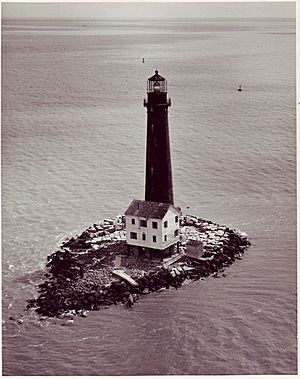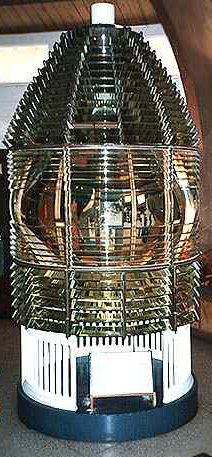Sand Island Light (Alabama) facts for kids
 |
|
| Sand Island lighthouse - 1962 | |
|
|
|
| Location | Sand Island Mobile County Alabama United States |
|---|---|
| Coordinates | 30°11′16″N 88°03′02″W / 30.18778°N 88.05056°W |
| Year first constructed | 1838 (first) 1859 (second) 1864 (third) |
| Year first lit | 1873 (current) |
| Automated | 1948 |
| Deactivated | 1971 |
| Foundation | stone |
| Construction | brownstone tower |
| Tower shape | tapered cylindrical tower with balcony and lantern |
| Markings / pattern | unpainted tower, black lantern and balcony |
| Height | 131 feet (40 m) |
| Original lens | 1838: 14 lamps with 16-inch reflectors 1859: First order Fresnel lens 1862-63: Fourth order Fresnel lens 1873: Second order Fresnel lens, now at the Fort Morgan Museum |
| Range | 0 miles (0 km) |
| Characteristic | F W |
| Fog signal | bell struck every 20 seconds |
| ARLHS number | USA-723. |
The Sand Island Light, also called the Sand Island Lighthouse, is an old lighthouse in Alabama, United States. It stands at the very southern tip of the state, close to Dauphin Island. This lighthouse is at the entrance of Mobile Bay. It is about 3 miles (4.8 km) away from the coast. The lighthouse itself is 132 feet (40 meters) tall.
Contents
History of the Lighthouse
The first lighthouse on Sand Island was built in 1837 by Winslow Lewis. It was finished in 1839 and stood 55 feet (17 meters) tall. This lighthouse used 14 lamps with special reflectors to create its light.
Lighthouses During Wartime
In 1859, a brand new lighthouse was completed on the island. However, this lighthouse did not last long. During the American Civil War, it was destroyed on February 23, 1863. Confederate soldiers at Fort Morgan saw Union soldiers using the lighthouse to spy on their fort. To stop them, the fort's guns fired and completely destroyed the lighthouse.
After that, a smaller, temporary wooden tower was built in 1864. This tower was 48 feet (15 meters) tall and was used until 1873.
Building the Current Lighthouse
The lighthouse you see today was finished by September 1864. It was built with a two-story home for the lighthouse keepers. At that time, the island was quite large, about 400 acres (160 hectares).
The base of the lighthouse is very strong. It is 28 feet (8.5 meters) wide and 6 feet (1.8 meters) thick. It sits on 171 wooden poles that are connected together. These poles are covered with 12 feet (3.7 meters) of concrete. The light itself shines from 125 feet (38 meters) above the water.
Challenges for the Lighthouse
Sand Island has always had problems with erosion. This means the sand and land around the lighthouse are slowly washing away. People have tried to stop this by adding large granite blocks to the island. These efforts helped to keep the island stable until about 2008.
The Sand Island Lighthouse faces a big problem, much like its "sister light," the Morris Island Lighthouse in South Carolina. Both lighthouses were built on sandy islands. Over time, these islands have eroded, leaving the lighthouse towers surrounded by water.
Helping the Lighthouse
In December 2011, a big project was completed to build a new island around the lighthouse. Workers used special equipment to pull 1,400,000 cubic yards (1,100,000 cubic meters) of sand from the sea floor. They placed this sand around the lighthouse. This created a new island that was about 2,600 feet (790 meters) long and 500 feet (150 meters) wide, covering about 15 acres (6.1 hectares).
However, less than a year later, a powerful storm called Hurricane Isaac washed away this $6,000,000 island.
The Dauphin Island Foundation is a group that works to help the Sand Island Lighthouse. They work with another group called the Alabama Lighthouse Association. These groups are in charge of the Sand Island Restoration Project. They have many people helping them, including the Mayor of Dauphin Island.
The Sand Island Lighthouse is on the Lighthouse Digest "Doomsday List." This list names lighthouses that are in danger of being lost. The lighthouse was also damaged by Hurricane Ivan in 2004 and Hurricane Katrina in 2005. Repairing this damage makes it harder to continue the restoration efforts.
The picture of this lighthouse was even used on a special stamp cancellation.
See also
 In Spanish: Faro de Sand Island para niños
In Spanish: Faro de Sand Island para niños
 | Dorothy Vaughan |
 | Charles Henry Turner |
 | Hildrus Poindexter |
 | Henry Cecil McBay |



